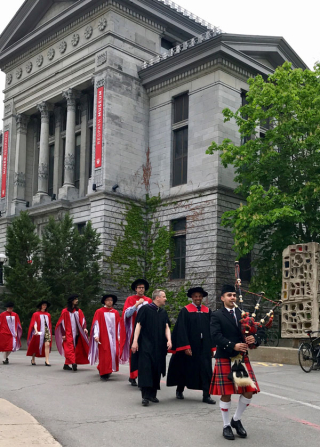Dev Jain was eager to participate in this year’s McGill Dobson Centre X-1 Accelerator, an intensive 10-week summer program that helps promising start-ups hone their business plans and prepare to pitch investors. But the young entrepreneur and recent McGill graduate had a more urgent duty to fulfill.
With Quebec’s health-care system stretched thin by the first wave of the COVID-19 pandemic, Jain was temporarily pulled away from his business venture. As a private in a Canadian Armed Forces reserve regiment (where he also serves as a bagpiper) he was deployed to work as an orderly in a Montreal-area long-term care facility.
“This was a time of crisis, and people needed help,” Jain says. “I never had any ambition to work in health care, but it was a unique experience. We had a few days of training, and then we had to learn on our feet. That’s a personal accomplishment I’m really proud of.”
Jain, who completed his bachelor’s degree in Mechanical Engineering last year, launched his company, RailVision Analytics, while he was still an undergraduate. The firm uses artificial intelligence to help railroads save fuel and improve safety. Its software products enable small railways to automatically retrieve data from their fleets and identify ways to operate more efficiently – adjusting driving speeds, for example, to optimize fuel consumption.
RailVision’s first customer, Ontario’s Metrolinx transport agency, won an environmental award last year from the Railway Association of Canada for a project that helped its GO Transit division reduce fuel consumption by 1.5 million litres a year and lower greenhouse gas emissions.
Dobson Cup win
Although Jain missed out on the Accelerator program, his month-long stint as an orderly ended in time for him to participate in the McGill Dobson Cup, a Dragons’ Den-style competition for aspiring entrepreneurs from across the university. Due to the pandemic, the judging was postponed from spring until late July this year.
RailVision won first place in the Innovation Driven Enterprise category.
“Dev came back hyper-focused” after his nursing-home deployment, says Marie-Josée Lamothe, Professor of Practice in the Desautels Faculty of Management and Academic Director at the Dobson Centre for Entrepreneurship. Lamothe was impressed as much by Jain’s “core human values” as by the potential of his business model.
“RailVision’s technology has the potential to disrupt in a meaningful way an old industry that is still vital for today’s economy,” she says.
Making an impact
McGill’s Dobson Centre for Entrepreneurship in numbers:
- 450 active start-ups
- 6,000 jobs created
- Close to $800 million raised by start-ups
- 10 McGill faculties
- 40% of start-ups founded/co-founded by women
The seed of an idea
As with the many entrepreneurs, Jain’s path to this point has been marked by plenty of twists, turns and challenges -- and a dash of serendipity.
After graduating from high school in Mississauga, Ont., where he grew up, Jain began studying Engineering Science at the University of Toronto. But two years into the program, he grew restive and decided to transfer to McGill and major in Mechanical Engineering.
During the summer before moving to Montreal, Jain worked at Metrolinx in Toronto. The experience planted the seed of his business idea: “I noticed they had a lot of data and didn’t do anything with it,” he says.
Most of North America’s 650 or so railways are in a similar fix. Unlike the handful of major railways, short-line and regional railroads don’t have teams of data scientists to develop advanced analytics, Jain says.
That’s where RailVision aims to come in. “We offer a solution that provides feedback to train operators and their supervisors and enables them to identify operational improvements,” Jain says. The company’s analytics dashboard tracks indicators such as fuel savings, safety compliance and on-time performance.
As Jain was shaping his business idea while studying at McGill, “I learned a lot in my Engineering program” that helped him push ahead, he says. In particular, a course in numerical methods, taught by Professor Mathias Legrand, “improved my ability to build out a lot of the software.”
As a transfer student, Jain didn’t get the typical first-year experience of living in residence. Instead, he moved into a house with five housemates – all from France or French-speaking areas of Quebec. Growing up in Ontario, he’d studied French. Now he was immersed in it. “I spoke more French than English, and that really accelerated my learning,” he says. He became fluent enough to take an Electrical Engineering class, en français, at Polytechnique Montréal.
Moonlighting as bagpiper
At the same time, Jain was also pursuing an unusual sideline vocation: bagpiping.
It all started in high school, when Jain went on vacation to Scotland. “I thought the pipes were unique and powerful,” so he picked up an inexpensive set to bring home.
Back in Ontario, he discovered he could get free lessons by joining a pipe band. So he did. When he got to Montreal, he joined the local Black Watch Association Pipes and Drums civilian band. Then, at a parade, someone from the Canadian Armed Forces told him if he played for the army’s Black Watch reserve regiment, he’d get paid for it. “I said ‘sure’,” he recalls.
As a result, during his final year of studies – while also running his fledgling company – Jain spent weekends doing basic training in Drummondville, Que.

The bagpipes opened other cultural doors. Last year, he was invited to play in a music festival in the Inuit village of Kangiqsujuaq in northern Quebec. “It was an incredible experience to go up there and talk to people,” he says.
A career highlight
The lilt of bagpipes is a hallmark of McGill Convocation ceremonies, with a kilt-clad piper leading University officials and students into the graduation site.

For his own graduation last year, Jain piped the procession into the tent. Then he rushed to the Arts building to change into his gown, crossed the stage with his fellow graduates – and, when it was over, piped them all out.
“It was definitely one of the highlights of both my bagpiping and my McGill career, together,” he smiles. “Being able to do that was just really cool.”
Startup tour
With the Dobson Cup prize under his belt, Jain will soon participate in Dobson’s annual McGill Startup Tour, which gives start-up founders a chance to pitch potential equity investors across North America and in the UK. (Like most such events these days, the roadshow will be virtual.)
RailVision is looking to raise more than $1 million, to enable it to commercialize and expand. “Within two years, we’re going to aim to go into other, similar transportation industries, which could include busing, or trucking, or maritime – anyone that owns or operates a fleet,” Jain says.
Meanwhile, he and his staff of six are working out of office space in Centech, a Montreal tech-business incubator, and Jain continues to have close ties with McGill’s Dobson Centre community. This allows the team to benefit from mentoring and “a lot of other services that will help us commercialize and help us grow.”
